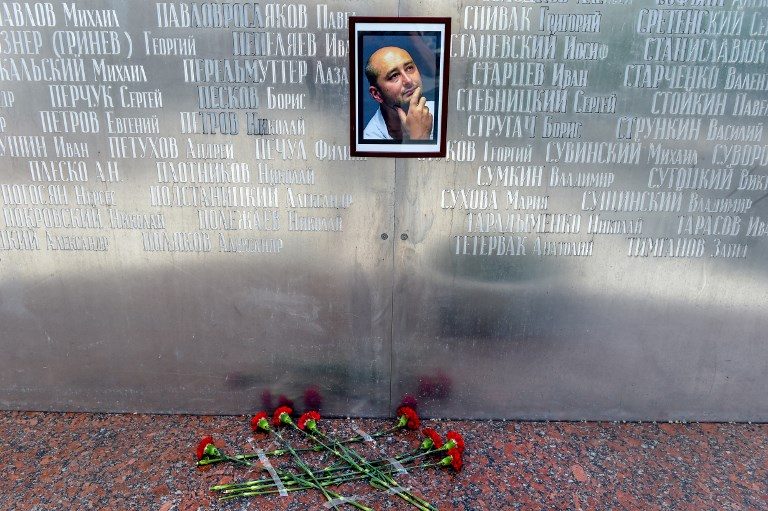SUMMARY
This is AI generated summarization, which may have errors. For context, always refer to the full article.

This story has been updated with admission on Ukraine that it had staged the killing of Arkady Babchenko.
MOSCOW, Russia – Russia’s embattled liberal community was reeling Wednesday, May 30, from the murder of fiercely anti-Kremlin journalist Arkady Babchenko who was gunned down in Ukraine after leaving Moscow following a campaign of harassment.
A prominent Russian war correspondent who became famous for his fierce tirades against Moscow, Babchenko, 41, was murdered on Tuesday evening, May 29, in a contract-style killing in the stairwell of his building in the Ukrainian capital Kiev where he moved last year.
Ukrainian authorities blamed Russia’s “totalitarian machine” for his murder, while Moscow denied the charges and the Kremlin warned that Kiev had become “a very dangerous place” for journalists.
His murder triggered a huge outpouring of grief among Russia’s liberal opposition, with journalists and politicians warning that Kremlin critics had become fair game under President Vladimir Putin.
Top opposition leader Alexei Navalny said he was “shocked,” writing on his blog that he had no doubt that the journalist was murdered because of his “public political position.”
Over the past years a number of Kremlin critics and Russian liberals have left the country after physical attacks and death threats and many blamed the atmosphere of growing intolerance under Putin for Babchenko’s death.
Opposition politician and former MP Ilya Ponomaryov, who now lives in Kiev, said he feared other Kremlin critics would be murdered in the future.
“Over the last 3 days, I have heard about 3 contracts taken out on Russian opposition figures among emigres,” he wrote on Facebook.
‘Terror attack’
Pavel Kanygin, an investigative reporter with Russia’s Novaya Gazeta liberal newspaper to which Babchenko contributed in the past, called his assassination “a terror attack” against journalists in both Russia and Ukraine.
“Arkasha would shoot straight from the hip every day in such a brazen manner that even those close to him felt uneasy sometimes,” Kanygin wrote, referring to his friend by his nickname.
Novaya Gazeta has lost a number of journalists over the past years including Anna Politkovskaya, gunned down in the stairwell of her Moscow apartment in 2006.
“Arkady knew what war was about, took part in it but always hated it viscerally,” the award-winning newspaper said in an editorial.
The Bell, a respected Russian media start-up, said it did not always agree with Babchenko but called him “a principled, passionate, brave man and journalist worthy of respect.”
Babchenko was killed less than a month after Putin was inaugurated for his 4th Kremlin term and as Russia gears up to host the World Cup later this month.
He was shot 3 times in the back in a killing reminiscent of that of another prominent Kremlin critic, politician Boris Nemtsov who was shot in the back as he walked near the Kremlin in February 2015.
The journalist quit Russia after pro-Kremlin supporters launched a campaign of intimidation and harassment after he wrote on Facebook he was not sorry when a plane transporting a Russian military choir crashed into the Black Sea en route to Syria in December 2016.
‘Toxic homeland’
Some liberals drew parallels with the case of Russian former double agent Sergei Skripal and his daughter who were targeted with a potent nerve agent in Britain in March.
“The toxic homeland is continuing to kill, poisoning the world already outside its borders,” wrote Sergei Medvedev, a professor at Moscow’s Higher School of Economics.
Natalia Gevorkyan, a Russian reporter living in France, said the situation was becoming so bad that the European Union and the United States should help protect people fleeing persecution and facing death threats in Russia.
Babchenko fought in Russia’s two Chechen campaigns in the 1990s and early 2000s before becoming a war correspondent and author. He repeatedly said he faced death threats.
He contributed to a number of media outlets besides Novaya Gazeta and was an avid blogger, accusing Russian authorities of slaughtering Kremlin critics and unleashing wars in Ukraine, Syria and elsewhere.
His increasingly bombastic posts constantly pushed the boundaries of good taste and some of his colleagues and followers stopped reading him in recent years.
Babchenko left Russia in February 2017, living first in the Czech Republic, then Israel, before moving to Kiev. – Rappler.com
Add a comment
How does this make you feel?
There are no comments yet. Add your comment to start the conversation.